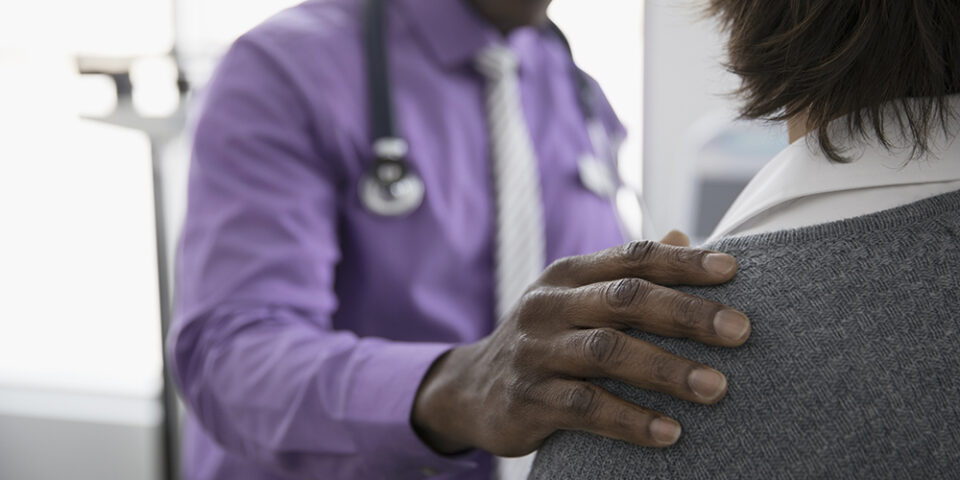What to expect after a colon cancer diagnosis
Whether it was found through a routine screening or because of symptoms, learning you have colon cancer is devastating news. Does this mean surgery is needed? What about a colostomy? Colorectal surgeon Cedrek McFadden, MD, explained what to expect after a colon cancer diagnosis.
How is colon cancer usually discovered and treated?
Colon cancer is generally discovered during a screening colonoscopy or with a diagnostic colonoscopy when the patient is having symptoms. A colonoscopy is a test that allows a doctor to see the inside of the large intestine to look for any growths or polyps. If any are found, they are removed and/or biopsied. Once biopsied, the pathologist will look at it under a microscope to see if the tissue is cancerous. When cancer is found, the next step is to find out the stage.
“The treatment really depends on the stage of the cancer,” Dr. McFadden said.
First, imaging will be performed with CT scans and/or MRI. These scans will help discover whether the cancer has spread to other areas. If the cancer is limited to the colon with no other areas involved, it may only require a surgical procedure. If the cancer has spread to the lymph nodes or other organs, treatment may involve a combination of surgery, chemotherapy and radiation.
Dr. McFadden said the decision about the course of treatment is a joint one, made by the patient with help from a multidisciplinary team.
“That’s one of the benefits of a great health system,” he said. “You have oncologists, surgeons, pathologists, gastroenterologists and radiologists who are part of the conversation. It’s not a unilateral decision that’s made. We’re not making decisions for the patient. We have conversations together. We share notes and have conversations to help make sure that the plan is unique and specific for the patient.”
What are the side effects of colon cancer treatment?
With surgical treatment, patients can experience postoperative changes such as changes in bowel habits. With chemotherapy and radiation, fatigue is a common side effect as well as nausea, vomiting, loss of appetite, bladder issues, neuropathy, and trouble remembering and concentrating.
If I have surgery, does that mean I’ll need a colostomy?
A colostomy is a temporary or permanent opening in the abdominal wall that allows waste to leave the body. Although it might be needed in some cases, having colorectal surgery does not necessarily mean you’ll need a colostomy.
“Often, that’s one of the biggest concerns from patients,” Dr. McFadden said. “They don’t want to have surgery because they don’t want the ‘bag.’ Fortunately, if we can get to your cancer sooner, before it’s an emergency, and the cancer is in a favorable location, a permanent colostomy is not something you’ll likely need.”
Can colon cancer be completely cured?
Absolutely. If all the cancer is removed during surgery and there’s no spread of the disease – or if there is and the chemotherapy treatment is successful – there’s a good chance you may be cured. It really depends on the cancer’s stage. The stages start at zero and go up to four.
For stage one colon cancer, which is restricted to the lining of the colon, the survival rate is more than 95%. This is why screening and early detection is so important.
What are the signs that colorectal cancer has spread? Does it happen fast?
A common sign that colorectal cancer has spread is significant weight loss. If a patient is having trouble breathing, that can mean cancer has spread to the lung. A CT scan can reveal if cancer has spread to the liver.
There’s no way to know how fast a cancer will spread, however, because every patient is different, and every patient’s treatment is different.
When should I consider a clinical trial?
That’s something you can discuss with your doctor at any time.
“In our conversations with patients, we may let you know about certain trials as we go through your treatment options,” Dr. McFadden said. “That’s what we do at Prisma Health. We readily have access to many of the clinical trials that you see at some of the larger institutions.”
What else should I be asking my doctor?
Here are some helpful questions you can ask your care team:
- Where in the colon is the cancer located?
- Did it spread anywhere else?
- What is the cancer’s stage and what does that mean?
- Will I need any other tests before we can decide on treatment?
- What are my treatment options?
- What are the side effects or risks?
- How long is the treatment?
- Where will this treatment be performed?
- How will this treatment affect my daily activities?
- What are the chances this cancer will come back?
- What will we do if the treatment does not work or if the cancer recurs?
“Take ownership of your health,” Dr. McFadden said. “That includes not being afraid to interact with us. We want you to ask questions. If you don’t think your treatment plans seem appropriate, don’t be afraid to speak up and ask for more information or another opinion.”
Find a doctor
Whether you’re looking for a primary care physician or need to see a specialist, we’re here to help with experienced, compassionate care near you.
Find a Doctor

